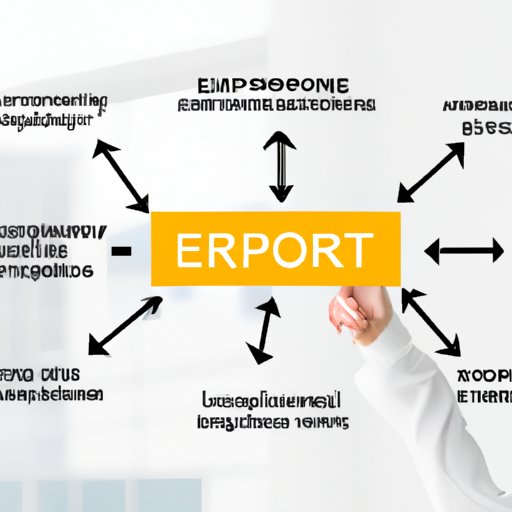Introduction
Enterprise resource planning (ERP) is an information technology system that helps organizations manage their business operations more effectively. ERP systems are designed to integrate all aspects of a business, including finance, sales, inventory management, human resources, and customer service. They enable organizations to streamline processes, improve accuracy, and increase efficiency. In this article, we will explore what ERP in technology is, provide a comprehensive overview of its advantages, challenges and trends, and discuss how to implement ERP solutions to maximize efficiency and productivity.
A Comprehensive Overview of ERP in Technology
In order to understand what ERP in technology is, it is important to first define ERP. ERP is a type of software application that enables a company to manage its various functions, such as accounting, inventory control, customer relations, and human resources. The software integrates all of these components into a single system, allowing for greater visibility and control over each aspect of the business. By using an ERP system, organizations can automate processes, reduce costs, and increase efficiency.
ERP systems typically consist of modules that allow users to access different areas of the system. For example, a module might be used to manage customer orders, while another module might be used to manage payroll. Each module is then integrated into the larger system, allowing users to access data from multiple sources. This allows for a more comprehensive view of the organization’s operations. Additionally, ERP systems are designed to be flexible and scalable, allowing organizations to easily adjust the system to meet their changing needs.
ERP systems are used by a variety of organizations, from small businesses to large enterprises. They are used to manage everything from financials to supply chain operations. Additionally, ERP systems are often used to help organizations comply with industry regulations and standards. By utilizing an ERP system, organizations can ensure that they are meeting all of the necessary requirements.

ERP: The Future of Business and Technology
ERP in technology has become increasingly popular as organizations strive to stay competitive in a rapidly changing business environment. There are many advantages to using an ERP system, such as improved organization and collaboration, increased efficiency, and cost savings. In addition, ERP systems offer powerful analytics capabilities, allowing organizations to gain valuable insights into their operations.
Additionally, ERP systems are evolving to meet the needs of modern business. Cloud-based ERP systems are becoming increasingly popular, allowing organizations to access their data from anywhere in the world. Additionally, mobile ERP solutions are becoming more prevalent, allowing employees to access their data on the go. Finally, artificial intelligence (AI) is being integrated into ERP systems, allowing for more accurate predictive analytics and decision-making.

Uncovering the Benefits of ERP in Technology
Organizations that implement ERP systems can reap a number of benefits. One of the primary advantages of using an ERP system is improved organization and collaboration. By integrating all of the organization’s data into a single system, teams can easily access and share information. This makes it easier for teams to collaborate and make informed decisions.
ERP systems also enable organizations to increase efficiency. By automating certain processes, organizations can reduce the amount of time spent on manual tasks. Additionally, ERP systems can reduce the risk of errors, which can save organizations time and money. Finally, ERP systems can help organizations reduce costs by streamlining processes and eliminating redundant tasks.

How ERP is Transforming Businesses and Industries
ERP systems are transforming the way businesses operate. By automating processes, organizations can reduce labor costs and increase efficiency. Additionally, ERP systems offer advanced analytics capabilities, allowing organizations to gain insights into their operations. Finally, ERP systems can improve customer service by enabling organizations to better track and respond to customer inquiries.
The use of ERP systems is also transforming industries. Organizations are utilizing ERP systems to automate processes, improve customer service, and increase efficiency. Additionally, ERP systems are being used to develop new products and services, as well as to optimize existing ones. As a result, organizations are able to remain competitive in a rapidly changing market.
Exploring the Challenges Faced by ERP in Technology
Although ERP systems offer numerous benefits, they can also present challenges. One of the primary challenges associated with ERP systems is technical complexity. ERP systems can be difficult to implement and maintain, and require a significant amount of training for users. Additionally, ERP systems can be vulnerable to cybersecurity risks, as hackers can exploit vulnerabilities in the system. Finally, ERP systems can pose data integrity issues, as incorrect or outdated data can lead to incorrect decisions.
Implementing ERP to Maximize Efficiency and Productivity
Organizations that want to maximize the efficiency and productivity of their operations should consider implementing an ERP system. The first step is to develop an ERP strategy that outlines the goals and objectives of the organization. This will allow the organization to determine which ERP solution is best suited to their needs. Once an ERP system has been chosen, the organization should begin the implementation process. This includes training employees on how to use the system and ensuring that the system is properly configured.
Finally, organizations should monitor their ERP system to ensure that it is functioning properly. This includes regularly checking the system for errors and ensuring that data is up-to-date. Additionally, organizations should periodically assess the effectiveness of their ERP system to ensure that it is meeting their goals and objectives.
Conclusion
ERP in technology is rapidly becoming an essential tool for businesses. By leveraging the power of ERP systems, organizations can automate processes, reduce costs, and increase efficiency. Additionally, ERP systems offer powerful analytics capabilities that can help organizations gain valuable insights into their operations. However, organizations must be mindful of the challenges posed by ERP systems, such as technical complexity and data integrity issues. By developing an ERP strategy and implementing a suitable ERP solution, organizations can maximize the efficiency and productivity of their operations.
(Note: Is this article not meeting your expectations? Do you have knowledge or insights to share? Unlock new opportunities and expand your reach by joining our authors team. Click Registration to join us and share your expertise with our readers.)
